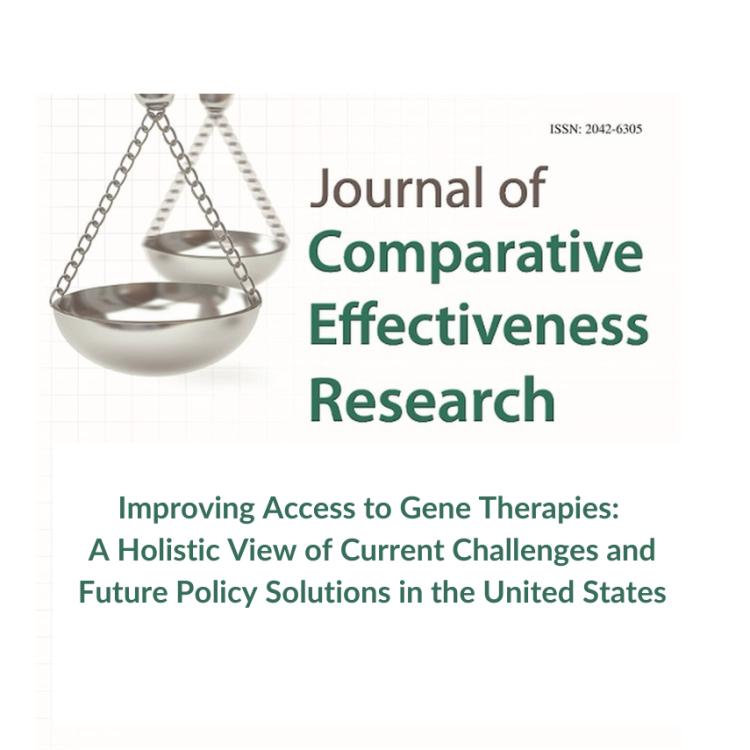Improving Access to Gene Therapies: A Holistic View of Current Challenges and Future Policy Solutions in the United States
For Immediate Release: November 19, 2024
Contact: Michael Pratt, 202-827-2088, [email protected]
Washington, D.C. – Gene therapies have the potential to deliver groundbreaking improvements in patient health outcomes across a wide range of diseases. Realizing this potential, however, will require that the U.S. healthcare ecosystem recognize and reward the value of these treatments and dismantle the structural and financial barriers that curtail meaningful access.
The paradigm shift in science represented by gene therapies poses new challenges that are preventing optimal patient access and failing to fully account for the value of these innovative treatments. A greater understanding of these challenges can promote more comprehensive and informed policy solutions to improve access to current — and future — gene therapy treatments.
Previous analyses on this topic have predominantly focused on the payment challenges associated with emerging gene therapies, particularly the barriers payers face related to short-term budget impact and plan coverage. “Improving Access to Gene Therapies: A Holistic View of Current Challenges and Future Policy Solutions in the United States,” a new analysis from the National Pharmaceutical Council published in the Journal of Comparative Effectiveness Research, provides a more holistic multistakeholder examination of the unique policy challenges associated with innovative gene therapies and explores opportunities for addressing those challenges. The paper is authored by Tyler D. Wagner, PharmD, PhD; Lisabeth Buelt, MPH; Kimberly Westrich, MA; and Jonathan D. Campbell, PhD, MS.
“Gene therapies promise to unlock substantial value for patients and society, but this value must be recognized and rewarded to ensure sustainable innovation,” explains Dr. Wagner, NPC Associate Director of Research. “A holistic understanding is important to inform the advancement of appropriate, evidence-based policy and market solutions that reward value and improve access.”
This examination of the broader policy landscape reveals that numerous challenges currently prevent optimal patient access to gene therapy treatments, including:
- Challenges related to the production and distribution of gene therapy treatments;
- Logistical and treatment administration obstacles; and
- Coverage and reimbursement limitations imposed by healthcare payers.
To address these challenges and improve patient access, the paper recommends:
- Relying on appropriate value assessment methods;
- Advancing innovative payment solutions;
- Removing inappropriate access barriers imposed by payers; and
- Improving education and awareness of treatment availability, benefits, and risks.
“Focusing exclusively on cost containment rather than evaluating and delivering value to patients and society likely has unintended consequences,” says Kimberly Westrich, coauthor and NPC Chief Strategy Officer. “For example, ICER’s self-created ‘shared savings’ method is not evidence-based, lacks methodologic rigor, operates in a false reality that does not reflect today’s marketplace, and risks disincentivizing research in important areas. A holistic view is essential to ensuring reliable patient access — now and in the future.”
The study also provides recommendations for moving forward with policy and market solutions that are comprehensive, sensitive to the uniqueness of gene therapies, and geared toward improving patient and societal health.
“The findings make clear that leaders must collectively strive for market-based policy solutions that reflect the uniqueness of gene therapies as a class of medicines,” said Dr. Campbell, coauthor and NPC Chief Science Officer. “A truly comprehensive approach that centers around patient health and societal benefits can unlock the full value of innovative therapies, stimulating further investment and discovery.”
Read the research:
“Improving Access to Gene Therapies: A Holistic View of Current Challenges and Future Policy Solutions in the United States” | Journal of Comparative Effectiveness Research
More From NPC:
"Will the Institute for Clinical and Economic Review’s Shared Savings Approach Decrease Value-Based Prices Most for the Most Severe Diseases?" | Value in Health
"Acknowledging the Challenges in Gene Therapy: Perspectives on ICER's White Paper" | National Pharmaceutical Council
About the National Pharmaceutical Council
The National Pharmaceutical Council (NPC) is a health policy research organization dedicated to the advancement of good evidence and science, and to fostering an environment in the United States that supports medical innovation. Founded in 1953 and supported by the nation's major research-based pharmaceutical companies, NPC focuses on research development, information dissemination and education on the critical issues of evidence, innovation, and the value of medicines for patients. For more information, visit www.npcnow.org and follow NPC on LinkedIn.
